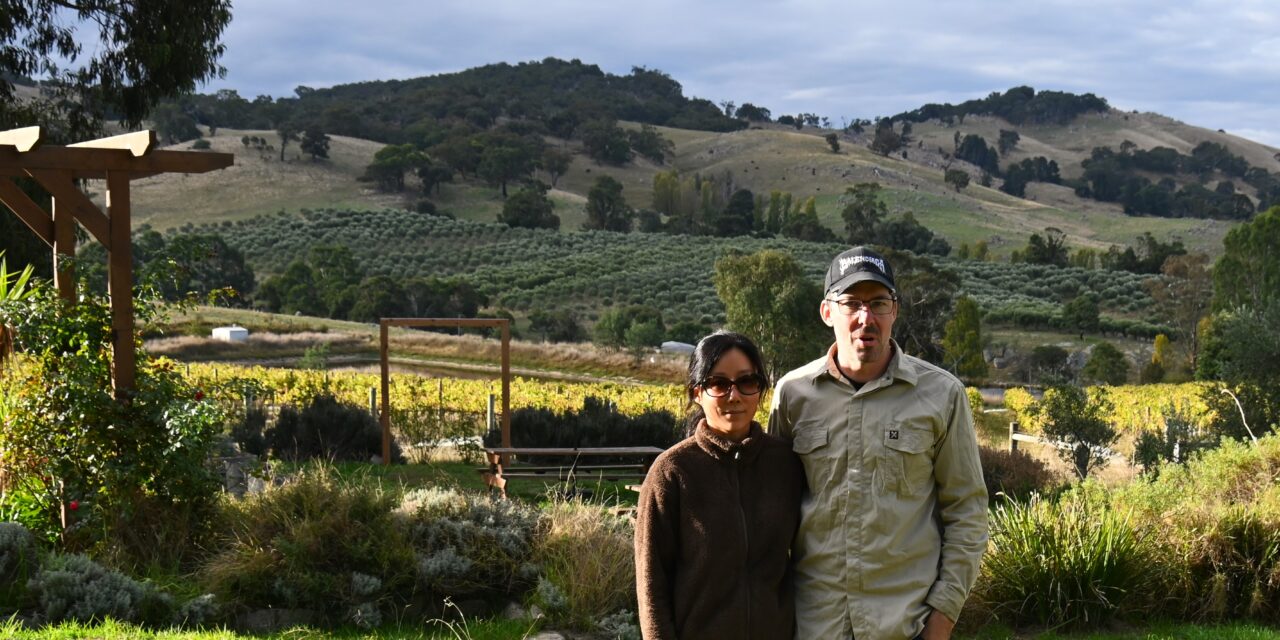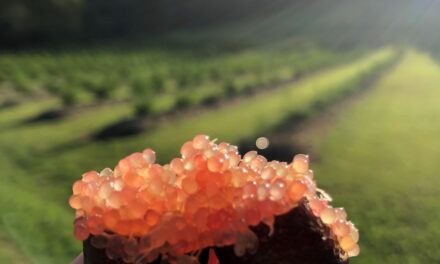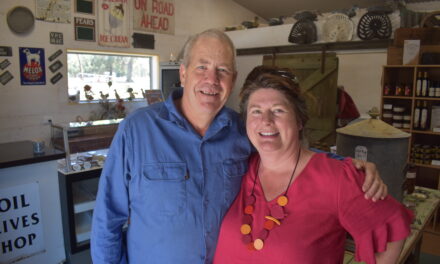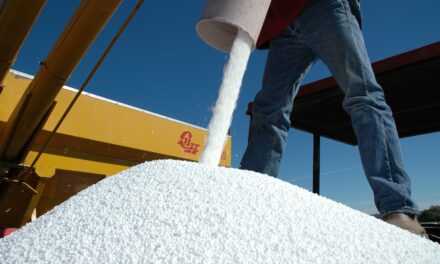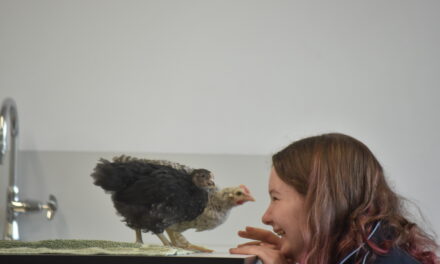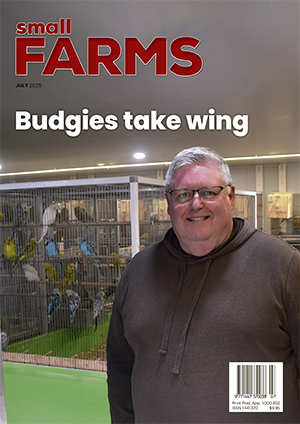There is no playbook for executing the perfect tree change.
If there was, the new owners of McIvor Estate — situated among the scattered granite boulders just west of Puckapunyal — would have their own chapter, towards the back perhaps, or an appendix continually reprinted as an ongoing addendum or maybe just a QR code for updates.
Simon Connelly and Eunji Kim defy convention.
Sitting down with Simon on a dining table so long and sturdy that you’d swear it was a retired bowling lane from a disused alley somewhere, while a toffee-coloured border collie pees in her excitement onto your boot while she leaps for affection, you’re really only just warming up to the adventure.
Throw into the newly minted vintner’s story some luck, bitcoin, lots of technology, karaoke (that’s right), battery-operated whiz-bang promotion, artificial intelligence, zero nonsense and a candour with what needs yet to be learnt, and you still don’t come to a definitive conclusion.
Add a twilight sky filled with cockatoos and currawongs that scarper with each random boom of an air canon (I jumped each time) and the challenges continue, not least Simon’s dry humour to which one needs conditioning:
“Oh, that’s Dad, we let him out with a shotgun occasionally – he’s harmless.”
“And do you like the table? Can you make it out? It’s a recycled lane from an old bowling alley.”
I can now see the fine lines and and guiding dots on the surface.
It’s an awful lot to take in.
Then you swirl a splash of the 2017 Sangiovese vintage around the glass and then again around your tongue and you remember that in the wine industry, you can quote just about anyone to make any point you like.
In this case, it’s Roger Ascham, tutor to Elizabeth the First: “By experience, we find out a short way by a long wandering.”
Simon and Eunji have a long journey ahead of them, but it has been made much easier by having bought with the estate a back catalogue of bottled vintages that are in very good shape indeed.
The journey is made easier still thanks to local support, a loyal mentor-cum-vigneron and the open welcome that they have for what’s still to come.
Sam Plunkett, founder of Wine By Sam, is part of Simon’s journey and praised his rapid learning pace and insatiable curiosity, noting his remarkable memory and attention to detail.
“He’s learning quickly,” Sam told Small Farms.
“He’s crazy smart and asks a lot of questions, he’s always trying to understand new things.
“And what a memory: he can feed back to me things we spoke about 12 months ago which I think he should barely remember.
“He recalled back to me the conversion which I only told him only the once about converting sugar concentration to alcohol content, and I thought ‘how the hell does he remember all that?’
“He recalled all of the numbers!”
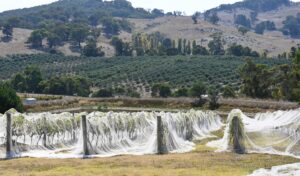
McIvor grows ten different varietals of grapes on 11 hectares and 8 hectares of well-aged olive trees.
The redefining of McIvor Estate does not hide that it is a work in progress that ignites Simon’s imagination and, not long after, that of any visitor.
This is due to Simon having on hand the luxury of a product which he is in no hurry to sell but is selling all the same through a cellar door and restaurant he’s had recently built from an old shed.
Simon met Eunji in 2010 at a karaoke bar, possibly singing Radiohead’s Creep — he says it was a bit too foggy to remember — and has experience in organising events and the nightclub scene professionally.
Since 2017, he has helped start-up tech businesses find their way into blockchain programming (I had to Google it) and is now a tech-savvy and sustainability-driven vintner in the making.
He has an electric vehicle to get around the farm and an electric lawnmower and is waiting for the electric tractor one day.
His take on starting the vineyard is more earthed than the clones starting their autumnal colour change.
“I cut my teeth as soon as we moved in, pruning the vines; and I know it’s a steep learning curve ahead, but there’s also a little bit of trial and error.
“I don’t think it’s all a cakewalk, I mean, the science behind caring about vines is definitely something I have got to listen to, but there are other practical things that just don’t always make sense.
“But they’re not new vines that have just been put in the ground, so there is something to build on.
“So, I just thought I’d taste and see and it has worked out so far.”
I was doing the same with something else by day’s end.
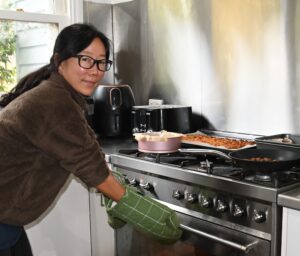
Eunji contributes to the restaurant and cellar with her baking skills, preparing here a Basque cheesecake for guests.
McIvor grows 10 different varietals of grapes on 11 hectares and across the valley there are 8ha of well-aged olive trees from which he has had a pressing already.
This year the grapes stayed on the vines up to five weeks longer than surrounding vineyards — McIvor is slightly elevated — so they have developed a fuller flavour.
On making visiting the vineyard something different from other winery experiences, Simon has quite a plan that he thinks will go beyond the conventional.
“We had a wine tasting group here the other day, and I showed a gentleman how to use a refractometer and, yeah, it was cool because you don’t get that kind of stuff at other vineyards and, also, it’s still quite new to me,” he said.
“And I love it; I love checking the sugar content and most winemakers would have no interest in showing anyone that.
“I want this place to be at the next level — this is how it should be.”
He also takes the wine-tasting experience into the personal, and while there is definitely personality in his delivery, he knows that he does not want to overwhelm people.
“I genuinely like talking about wine and I genuinely like engagement and talking to people and finding out about their lives.”
I ask what he wanted his winery to be known for in 20 years and his answer took much deliberation.
“That sort of depends on whether I’m still standing here behind the bar because would I want to do that every weekend for the rest of my life? Maybe not, but you know, while I’m still finding my feet here, I actually enjoy it.
“I don’t understand all about tasting, but I do want to get into it.”
The question is pressed further and there’s some out-loud thinking to get through before he nails it.
“What would I want people to say?
“I haven’t thought about the elevator pitch that much to be honest.
“Amazing, amazing landscape.
Still not there, for mine.
“Like I mean, this is the epitome of other places.”
Finally: “Just a killer experience — I want visitors to take in the full experience.
“You don’t need to be told what to experience — you just need to soak it up and I guess here we allow people to just relax and take it all in and not feel rushed like you can at other wineries.”
“We don’t charge for wine tasting – most vineyards do – because I figure if people liked the wine, they’ll buy it, so I don’t ever put that pressure on them: you can tell that people like the wine and if they don’t like it then there’s no way I want to push them.
“If they say they cannot choose which one to buy, then for me that’s a success metric.
“But at the same time, there’s so many different varieties we’ve got that if there’s not something they like, I don’t know why they’re at a winery.”
Simon also wants to develop Kalamata olives for the table and work on what he calls the ‘verticals’ of the business, such as accommodation and hosting weddings.
The building of their restaurant from an old shed into something quite nice for casual dining is already a ‘vertical’. It opened in December.
Things continue to develop fast: labels designed by artificial intelligence, sparkling Shiraz — made in the proper champagne style — might cost more when it’s launched but, in his style, this is because ‘it’s going to be unbelievable’.
He has plans for some novel marketing using the expertise of tech’ associates and has quite a unique label planned which he is keeping under wraps for now.
“And we want to gear some things toward nightclubs to get that niche label into those clubs — like a luxury brand for fun.
“I just want to try and make a little bit of mark and do something different and not do the same as everyone else.”
A tour in an electric Polaris through the olive trees up to the magnificent rear hill covered with boulders passes flying kangaroos and sleeping steers who rustle up a bit of panic in the dust.
I am asked to alight the vehicle so he can cross an impossible-looking ford through a creek where last year’s rain has washed the earth down to the culverts.
I was glad I got out as Simon likes to do his own stunts; no-one got hurt.
We pass the air canon, and it fires not long after. I jump.
“Missed!” he yells.
The afternoon ended with a tasting session in the neat-as-a-pin restaurant-cum-cellar door.
The experience at the bar unfolded exactly as he described in his intended future plan.
There’s no hyperbole in saying that the very peppery raw olive oil served along with two balsamic vinegars and dipping bread, was something else, and the 2017 Sangiovese stood out as the finest wine I have ever tried, its taste resembling honey, a departure from the typical descriptors found on labels.
Simon spoke about wine complexity and tannins with the finesse of a professional.
He also delved into the mineral impact on the taste of wine due to the granite that the land sits atop.
Despite his modesty, he is definitely not faking-until-making. He’s honest.
“No, I am getting there,” he insists.
The fruit has already got there and over in Seymour, Sam receives Simon’s harvest to ferment and bottle up and commends its quality, highlighting McIvor Estate’s potential for greatness, beyond just a ‘great’ location.
“The quality of fruit he has produced is a step up; he’s doing all the things to maximise productivity,” Sam said.
“The Shiraz we saw this year was some of the highest quality — it could be that one-percenter.
“By that I mean what distinguishes great from good are tiny incremental lifts in quality, and he’s achieving that.
“McIvor Estate could be next-level iconic.”
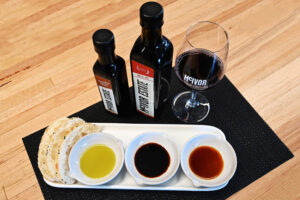
A big part of the tasting experience is a platter to showcase the freshly pressed, unfiltered and very peppery olive oil along with caramelised and merlot balsamic vinegars. The estate presses its own extra virgin oil in collaboration with a neighbour.
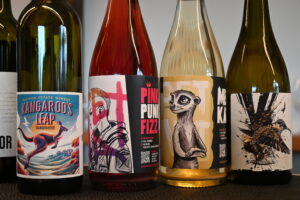
The digital meets the traditional. Simon has value-added to the past vintages of the estate by designing labels with the help of artificial intelligence.
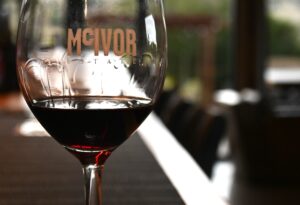
McIvor Estate has a strong selling base despite being in new hands, with Simon and Eunji buying up also past vintages from the vineyard which are proving to be strong sellers. Simon does not mind if visitors to the cellar door cannot make up their mind. If they say they cannot choose which one to buy, then for me that’s a success metric.
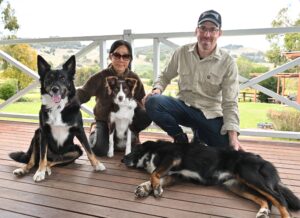
Simon and Eunji are working towards being off-grid in the near future, to give security to their energy needs. The couple met in 2010 at a karaoke bar and haven’t looked back. Simon is tech-savvy and driven to achieve sustainability, building up their stable of electric farm vehicles. Here, Ddori, Syrah and Crypto complete the family.
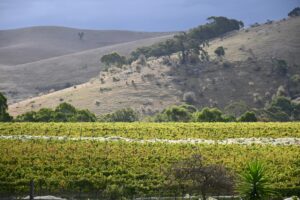
The higher elevation of the estate compared to surrounding areas resulted in this year’s harvest staying on the vines for up to five weeks longer than surrounding, allowing the fruit to develop a fuller flavour.

